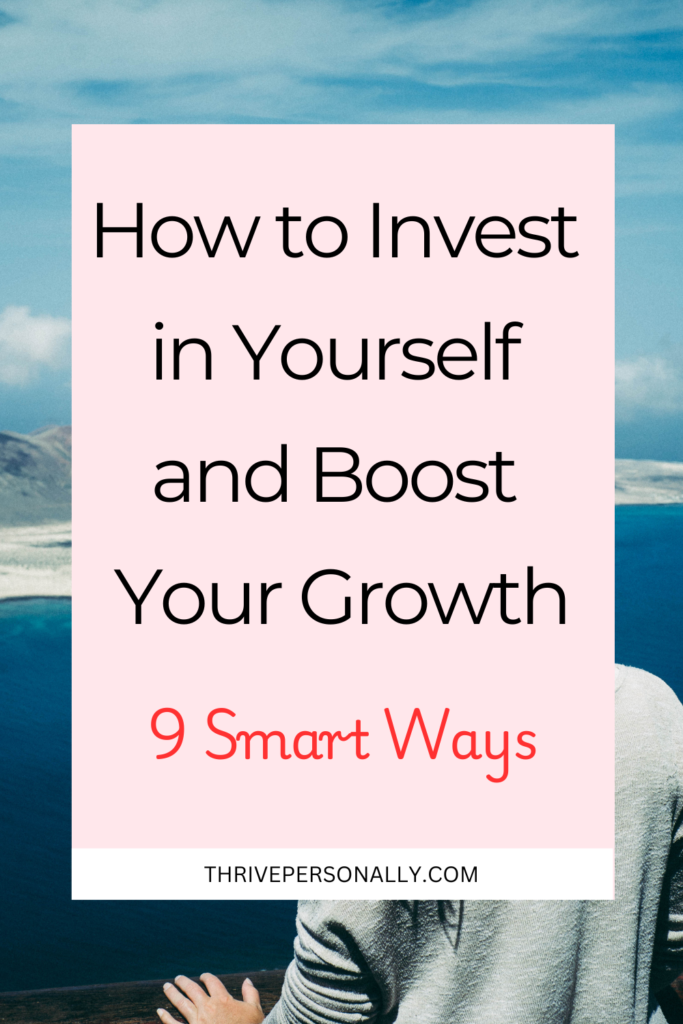Investing in yourself is one of those things everyone should practice, but surprisingly few do. Think about what investing in yourself really means. Sure, you have to spend money to do it sometimes. However, investing in yourself simply means you’re making your life better.
Investing in yourself means believing in yourself. When you invest in yourself, you’re taking the steps necessary to become more confident, more skilled, and happy.
Investing in yourself can come in many forms, whether that be going to school or taking care of your body. Allow these actions to empower you to take on bigger challenges.
Here are nine ways you can start investing in yourself and your growth today:
1. Set Goals
Setting goals is the first step to start investing in yourself. This might seem like an obvious step, but by knowing your goals and what you want to achieve, you won’t waste time banging your head against the wall.
Take time to sit down and really think about what you want to improve on in your life and what your vision of success looks like. Write down your goals and use them to hold yourself accountable.
Read also: 9 Common Goal-Setting Mistakes You Should Avoid
2. Read More

Reading is one of the best ways you can invest in yourself. By reading, you open yourself up to a world of information and knowledge. You never know when something you read can help you better yourself or others.
Read books, read articles, read poetry. Don’t be afraid to challenge your mind and read different things. Reading can help you expand your mind and think about things you wouldn’t have considered.
Make sure to take time each day to read. Whether you read in the morning or before bed, set time aside to read. Even if it is 20–30 minutes, you can start a reading log or journal and keep track of the books you read.
Another thing you want to keep in mind when reading is to challenge your mind with new books. Pick books that will help you grow and make you think about things a different way.
Look into reading biographies about people you look up to, read psychology books, or books that can help you with finance or be more productive.
You never know what you may learn that can help you expand your horizon and maybe find a new field, industry, or topic you’re passionate about.
Read Also: How to Change Your Life Starting Now – 8 Steps
3. Learn Something New
Learning is something we should all do daily. There are so many benefits to learning new things. One benefit is that you’ll become a more valuable asset to your company.
If you want to move up in your career or even change careers, what you know will help you. The opportunities you will come across by knowing more will be endless.
Thankfully, there are so many ways to learn new things. You can learn online, in classes near you, or even at a local workshop.
Learning online has come a long way. There are so many websites that offer free and low-cost classes. Websites like Coursera, Udemy, and LinkedIn Learning offer classes on just about any subject.
Learn a programming language, graphic design, another language, learn about marketing. These classes will help you learn at your own pace and fit your busy schedule.
Not only will you learn something new, but you can even receive certificates to put on your resume.
You can also take classes at your local library or community college. Not only will you learn from these classes, but you’ll also get to meet other people who have the same interests as you.
Take a pottery class or a public speaking class. You can also use these classes to help you become more confident around others.
4. Network
When most people think about networking, they think of ways to get a better job. While networking can help you get a better job, think of networking as a way to help you grow.
Building relationships with others is a great way to not only help others but can greatly impact your personal life as well.
The first step to networking with others is to simply get to know people. Next time you’re at a social event, workshop, or even an online forum, take the time to introduce yourself to someone new.
You can start simply by saying, “Hi, my name is ___. What do you do?” You never know how that person can impact your life.
Once you build that relationship with someone meaningful, you want to keep that communication open. Ask that person how their day was and show interest in what they have to say.
The more you get to know someone, the more they will open up to you as well. Once you click with that person, remember to ask for their advice and help.
You would be surprised how many people want to help but don’t ask. By asking for help, not only are you helping yourself, but you’re allowing that person to help you grow as well.
If that person is experienced enough, they may be able to show you the skills and techniques they use that can help you.
Remember to always give as well as take. If someone asks you for help, don’t turn them away. Let that person learn from your knowledge and experience.
5. Invest in Your Health
One of the best ways to put money towards yourself is to invest in your health. Not only will your body thank you, but by taking care of your body, you’ll be able to think clearer and get more stuff done.
Start by eating healthier. Not only will eating better help your body, but it can help your mind as well. Make sure you’re eating foods that will give you energy to get you through the day.
Eat foods such as fruits, vegetables, whole grains, and lean proteins. Also, make sure you’re drinking water throughout the day. Staying hydrated can help your thought process and clear your mind.
When you’re happier and healthy, you can go after your goals with more intensity.
Like I said before, exercise is key when it comes to your body. Exercising doesn’t mean you have to go to the gym and lift weights.
Go for a walk, run, do yoga, or lift weights. Exercising will help rid your stress and make you happier because of the endorphins your body releases when you exercise.
Not only will this make you happier, but you’ll feel more accomplished. Give yourself goals to look forward to when you exercise.
Maybe try to eat better and exercise for a month. See how you look and feel after that month is up.
Last but not least, make sure you’re getting enough sleep. Your body needs sleep to repair from your long days.
When your body doesn’t get enough rest, you’ll feel tired throughout the day. Your mind won’t be as sharp and you won’t be able to focus.
You also won’t be able to control your emotions as well. Try to get 8 hours of sleep each night, and your day will feel a lot better.
6. Find a Mentor
Finding a mentor is another great way to help you grow. A mentor is someone that has knowledge and experience in your field of interest.
They can help you along your career or life path and provide valuable insight into things they have learned along the way.
Finding a mentor may take some time and searching. But here are some tips to help you find that great mentor.
First, you want to ask yourself what you want to learn. Do you want to learn more about your career? How to network? Maybe you just want to learn how to better yourself.
Once you know what you want to learn, you can now search for that mentor. Look through professional networks, local workshops, and seminars.
You can also look online through LinkedIn. When searching for that mentor, keep an eye out for someone that wants to help others as well as someone that knows what they’re talking about.
Once you have found a few potential mentors, go introduce yourself. You can simply message them online, or if you see them at a workshop, introduce yourself.
You can tell them how much you admire their work and that you would love to learn from them. When speaking to that person, be sure to ask how you can benefit from them.
Let that person know what you hope to gain by having them as a mentor. Ask them how they can help you on your journey.
Read Also: 9 Reasons Why Morning Exercise is Better than Evening Workouts
7. Take Risks

Taking risks is something we all should do every once in a while. When you take risks, you open yourself up to new experiences that can help better you as a person.
You never know what you’re capable of until you try something new. By challenging yourself, you can learn skills you didn’t know you may have.
Failure is something everyone should experience. When you fail at something, you learn from your mistakes.
Start to look at failures as something that can help you rather than something sad that happened. By doing this, you’ll start to develop a growth mindset.
Taking risks can also allow you to be more confident when faced with challenges. Once you take that risk and come out successful, you’ll be more willing to take those risks.
You don’t want to be reckless when taking risks, but rather take calculated risks. Weigh out the outcome and be prepared for whatever may happen.
8. Practice Mindfulness
Mindfulness has become such a huge thing these days. And for good reason, being mindful is a great way to help yourself grow.
By being mindful, you are allowing yourself to clear your mind of any thoughts. When you’re practicing mindfulness, you’re focusing on your bodily sensations, feelings, and thoughts in the present moment.
You don’t want to judge yourself when practicing mindfulness either. Take a few minutes each day to clear your mind and be present in the moment.
You can even practice mindfulness when you’re doing your daily tasks. Take time when you’re eating your food or take a walk and practice mindfulness.
You can even journal your thoughts and feelings, which can help you better understand how you’re growing.
Take time to reflect on your day, what went well, and what you can improve on. By self-reflecting, you can hold yourself more accountable and stay mindful of your goals.
9. Seek Feedback
Always ask for feedback from others. Oftentimes, we think we’re doing better than we actually are.
When others who know you and your work better than you do give you constructive criticism, take it and run with it.
First, you want to make yourself available for others to give you feedback. When asking for feedback, you want to be specific on what you want to improve on.
If you know what you want to improve on, your peers can now focus on that and give you better feedback.
Remember, when someone is giving you feedback, they are trying to help you. Don’t take what they say personally and use the advice they give you to better yourself.
When you get feedback, ask questions if you don’t understand something.
You want to take that feedback and reflect on what they said. Think about what they said and how you can use that information to better yourself.
Try to ask for feedback in the middle of a project as well. This way, you can continue to better your project as you’re going.
Use that feedback to show how you can grow and improve.
Conclusion
Investing in yourself is key when trying to better yourself. There are so many ways you can start investing in yourself. Whether you decided to learn a new skill or took my tip and started reading more.
Just remember, your journey starts today! You’ll never know if you don’t try, so start taking action on these tips and you’ll be living a brighter, more successful life.
Save the pin for later



